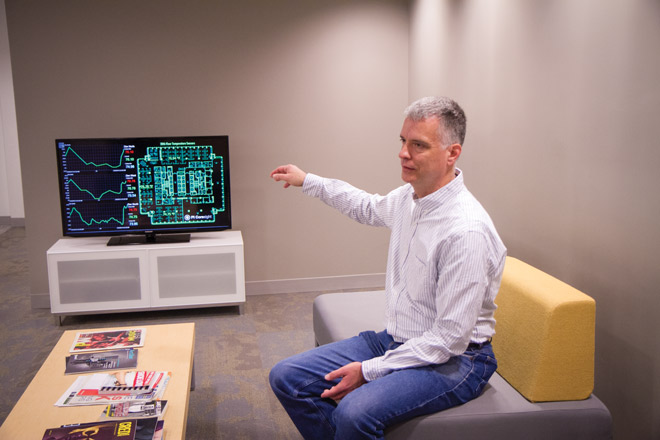
Due to a stroke of bad luck at EMU – which turned into good luck in the end – John Swartzentruber ’85 spent his senior year working on Apple IIe computers. This put him at the vanguard of the coming PC revolution. (Photo by Jon Styer)
Running a power plant effectively requires keeping tabs on an awful lot of data relating to fuel consumption, power output, weather conditions, grid demand, etc. & etc. And in turn, keeping tabs on all this data effectively requires clever software that allows users to visualize and understand what might otherwise be a confounding torrent of raw information.
John Swartzentuber ’85 has been working on that very sort of software with a company called OSIsoft for the past eight years. Swartzentruber is a development lead, working out of the company’s Philadelphia office. He leads a team of developers working on next iterations of the data analysis software, while coordinating with other team leaders, helping to plan release cycles, recruiting new staff and consulting with clients – power plants aren’t the only ones; many different industries have lots of data to manage – to improve the software’s “user experience design.”
An ideal user experience would render its designers invisible. When programs are working smoothly, doing what they’re supposed to, people don’t spend time thinking about why that’s the case.
“We strive to be unappreciated, almost,” Swartzentruber says. “If people don’t notice the software, you’re doing your job right.”
Accomplishing that often requires out-of-the-box thinking; new challenges keep things interesting.
“It’s not just rote,” he says. “You really have a lot of creative flexibility to figure out the best way to get there.”
Thirty years ago, when Swartzentruber was working on his computer science minor at EMU (a major wasn’t available yet), he took a class called “Programming Languages,” during which longtime computer science professor Joe Mast assigned something involving a fairly esoteric language known as LISP. It was a toughie – so difficult, in fact, that Mast eventually cancelled the assignment. Inspired by the challenge, though Swartzentruber buckled down and kept at it and finally came up with a solution.
LISP isn’t something he actually uses anymore, but the appreciation it taught him for approaching problems from new angles has. Thinking of becoming a programmer? Go down the rabbit hole with something weird or obscure. Diversify your toolbox.
“It’s important to think in a different kind of way, to try something completely different,” he says.
Between Swartzentruber’s junior and senior years, EMU’s nascent computer science program suffered something of a setback: its PDP-11 – the machine that every computer student shared time on – died. (The PDP-11 was a “minicomputer,” an amusingly dated description in this smartphone era.)
That meant Swartzentruber spent his senior year working on Apple IIe computers, which turned out to be at the vanguard of the coming PC revolution, and which ultimately meant that the demise of the PDP-11 was actually a stroke of good fortune for students affected by the loss.
“In a lot of ways, I felt very well prepared [for work after college],” he says. “We sort of got into the PC world a little quicker.”